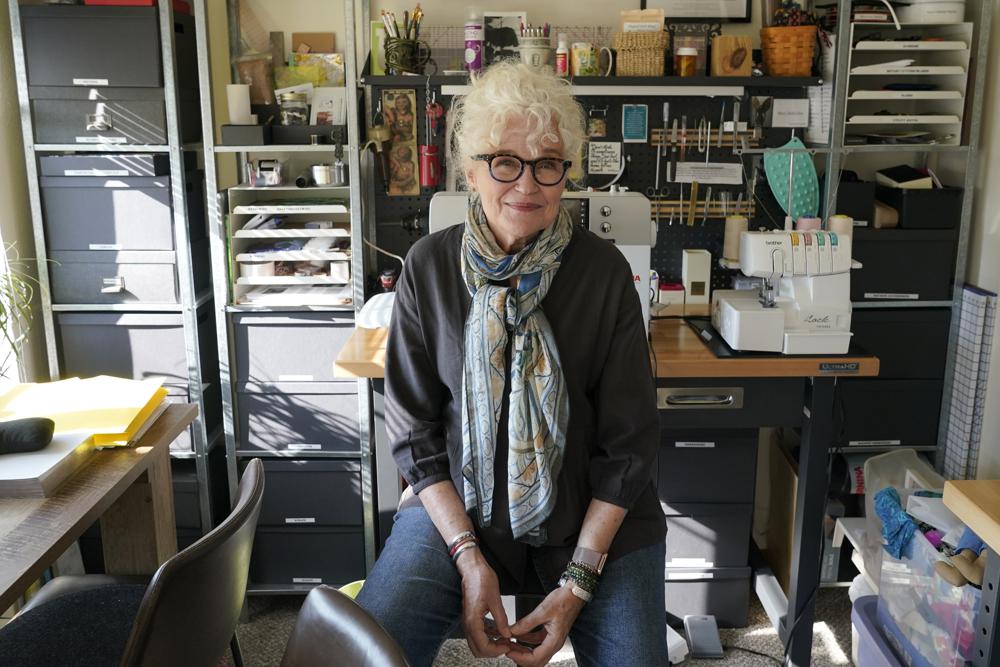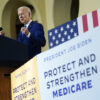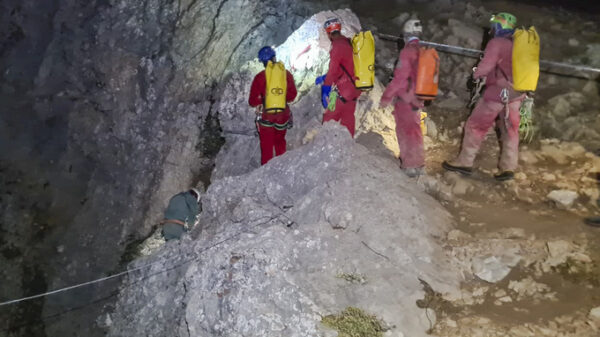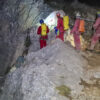Mary Beth Orr poses for a photo in her home, Tuesday, Aug. 23, 2022 in Burien, Wash., south of Seattle. Orr used to have five or six drinks every evening and more on weekends before she enrolled in a study in 2018 to see if the compound in psychedelic mushrooms could help heavy drinkers cut back or quit entirely. She stopped drinking entirely for two years, and now has an occasional glass of wine, and credits psilocybin for her progress. (AP Photo/Ted S. Warren)
The compound in psychedelic mushrooms helped heavy drinkers cut back or quit entirely in the most rigorous test of psilocybin for alcoholism.
More research is needed to see if the effect lasts and whether it works in a larger study. Many who took a dummy drug instead of psilocybin also succeeded in drinking less, likely because all study participants were highly motivated and received talk therapy.
Psilocybin, found in several species of mushrooms, can cause hours of vivid hallucinations. Indigenous people have used it in healing rituals and scientists are exploring whether it can ease depression or help longtime smokers quit. It’s illegal in the U.S., though Oregon and several cities have decriminalized it. Starting next year, Oregon will allow its supervised use by licensed facilitators.
The new research, published Wednesday in JAMA Psychiatry, is “the first modern, rigorous, controlled trial” of whether it can also help people struggling with alcohol, said Fred Barrett, a Johns Hopkins University neuroscientist who wasn’t involved in the study.
In the study, 93 patients took a capsule containing psilocybin or a dummy medicine, lay on a couch, their eyes covered, and listened to recorded music through headphones. They received two such sessions, one month apart, and 12 sessions of talk therapy.
During the eight months after their first dosing session, patients taking psilocybin did better than the other group, drinking heavily on about 1 in 10 days on average vs. about 1 in 4 days for the dummy pill group. Almost half who took psilocybin stopped drinking entirely compared with 24% of the control group.
Only three conventional drugs — disulfiram, naltrexone and acamprosate — are approved to treat alcohol use disorder and there’s been no new drug approvals in nearly 20 years.
While it’s not known exactly how psilocybin works in the brain, researchers believe it increases connections and, at least temporarily, changes the way the brain organizes itself.
“More parts of the brain are talking to more parts of the brain,” said Dr. Michael Bogenschutz, director of the NYU Langone Center for Psychedelic Medicine, who led the research.
Less is known about how enduring those new connections might be. In theory, combined with talk therapy, people might be able to break bad habits and adopt new attitudes more easily.
“There’s a possibility of really shifting in a relatively permanent way the functional organization of the brain,” Bogenschutz said.
Patients described life-changing insights that gave them lasting inspiration, Bogenschutz said.
Mary Beth Orr, 69, of Burien, Washington, said her psilocybin-induced hallucinations — flying over breathtaking landscapes and merging telepathically with creative people throughout history — taught her she wasn’t alone.
Before enrolling in the study in 2018, Orr had five or six drinks every evening and more on weekends.
“The quantity was unacceptable and yet I couldn’t stop,” she said. “There was no off switch that I could access.”
During her first psilocybin experience, she saw a vision of her late father, who gave her a pair of eagle eyes and said, “Go.” She told the therapists monitoring her: “These eagle eyes can’t see God’s face, but they know where it is.”
She stopped drinking entirely for two years, and now has an occasional glass of wine. More than the talk therapy, she credits psilocybin.
“It made alcohol irrelevant and uninteresting to me,” Orr said. Now, “I am tethered to my children and my loved ones in a way that just precludes the desire to be alone with alcohol.”
Patients receiving psilocybin had more headaches, nausea and anxiety than those getting the dummy drug. One person reported thoughts of suicide during a psilocybin session.
In an experiment like this, it’s important that patients don’t know or guess if they got the psilocybin or the dummy drug. To try to achieve this, the researchers chose a generic antihistamine with some psychoactive effects as the placebo.
Still, most patients in the study correctly guessed whether they got the psilocybin or the dummy pill.
Paul Mavis couldn’t guess. The 61-year-old from Wilton, Connecticut, got the placebo, but still quit drinking. For one thing, the talk therapy helped, suggesting to him that his emotional life stalled at age 15 when he started drinking to feel numb.
And he described a life-changing moment during a session where he was taking the dummy drug: He imagined the death of a loved one. Suddenly, an intense, incapacitating grief overcame him.
“I was crying, which isn’t typical for me. I was sweating. I was bereft,” he said. “As I’m trying to reconcile this grief, like, why am I feeling this?
“Instantly, I thought, ‘Drinking equals death.’” He said he hasn’t had a drink since.
Dr. Mark Willenbring, former director of treatment research at the National Institute for Alcohol Abuse and Alcoholism, said more research is needed before psilocybin can be considered an effective addition to talk therapy. He noted that talking with a therapist helped both groups — those who got psilocybin and those who didn’t — and the added benefit of psilocybin appeared to wear off over time.
“It’s tantalizing, absolutely,” Willenbring said. “Is more research required? Yes. Is it ready for prime time? No.”
The Associated Press Health and Science Department receives support from the Howard Hughes Medical Institute’s Department of Science Education.
Copyright 2021 Associated Press. All rights reserved.
Source: https://apnews.com/article/mushroom-psychedelic-alcoholism-study-a3b6692ae7590de9fd09a7cac271a199









































